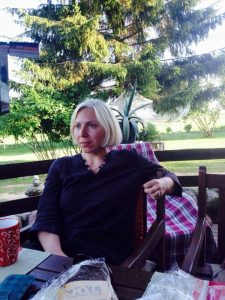 Rūta Šlapkauskaitė is an Associate Professor of English literature at Vilnius University, Lithuania. Her research interests include Canadian and Australian literature, neo-Victorianism, and environmental humanities. Among her recent publications are “An Ecology of the Hewn in Susan Vreeland’s The Forest Lover” in the collective monograph The Northern Forests co-published by the University of Tartu and Montreal’s Imaginaire Nord; “The He(A)rt of the Witness: Remembering Australian Prisoners of War in Richard Flanagan’s The Narrow Road to the Deep North” in Anglica: An International Journal of English Studies; and “Precariousness, kinship and care: Becoming human in Clare Cameron’s The Last Neanderthal” in The Journal of Commonwealth Literature.
Rūta Šlapkauskaitė is an Associate Professor of English literature at Vilnius University, Lithuania. Her research interests include Canadian and Australian literature, neo-Victorianism, and environmental humanities. Among her recent publications are “An Ecology of the Hewn in Susan Vreeland’s The Forest Lover” in the collective monograph The Northern Forests co-published by the University of Tartu and Montreal’s Imaginaire Nord; “The He(A)rt of the Witness: Remembering Australian Prisoners of War in Richard Flanagan’s The Narrow Road to the Deep North” in Anglica: An International Journal of English Studies; and “Precariousness, kinship and care: Becoming human in Clare Cameron’s The Last Neanderthal” in The Journal of Commonwealth Literature.
Article: Pro Pelle Cutem: On the Subject(s) of Extraction in Fred Stenson’s The Trade
Abstract
This paper examines the poetic means Fred Stenson employs in his novel The Trade to dramatize the environmental and affective legacies of the fur trade in Canadian history. Taking its cue from the HBC’s motto and Hortense Spillers’ and Kathryn Yusoff’s thinking about race and flesh, the article considers how the novel expands our reading of the ethics of extraction, organized through the division between living and non-living matter, by correlating its use of the tropes of the skin, bones, and rum to the semiotics of the Windigo figure, which mediates settler colonialism’s extraction of subjectivity through the racial division between humans and nonhumans across the imperial body politic. In thus reappraising the HBC’s interventions into Indigenous ecologies, The Trade highlights the material and visceral impact of the extractive economy while also troubling our ethical readings of Indigenous trauma and resilience.
Canadian Literature special issue #251 on poetics and extraction is available to order through our online store at https://canlit.ca/support/purchase/single-issues.